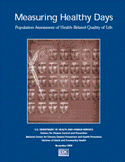CDC Health-Related Quality of Life Social and Behavioral Sciences Curricular Materials Overview
HRQOL Curricula Materials
- Biostatistics
- Behavioral Sciences
- Environmental Health
- Epidemiology
- Policy
Social and Behavioral Sciences Assignment 1
Title: Health Behavior Impact on Health-Related Quality of Life (HRQOL): Article Review and Behavioral Science Intervention Proposal
Student is asked to review an article available from the HRQOL Program Web site on a health behavior of interest and to note its impact on HRQOL. In a brief paper, the student is asked to propose a theoretically-based intervention to modify the unhealthy behavior to improve HRQOL. Intermediate-level students should also devise and describe an intervention evaluation plan.
Activities
Student learns to read and understand the scientific literature, identify HRQOL impacts of health behaviors, use behavioral theory in intervention development, and consider evaluation issues.
Materials Included
- Professor lesson plan [DOC-52KB].
- Student instructions handout [DOC-39KB].
- PowerPoint slides with assignment background information and introduction.
Social and Behavioral Sciences Assignment 2
Title: Needs Assessment to Identify Disparities in Health-Related Quality of Life (HRQOL)
Student is asked to measure HRQOL in a small group, compare and contrast findings to state estimates (available online), explain any observed differences, and propose a theoretically-based intervention to improve HRQOL. This assignment is appropriate for intermediate-level students.
Activities
Student learns to develop and administer a questionnaire, compile data and calculate the Healthy Days measures, compare and contrast data, and develop a theoretically-based intervention.
Materials Included
- Professor lesson plan [DOC-54KB].
- Student instructions handout [DOC-43KB].
- PowerPoint slides with assignment background information and introduction.
ASPH Competencies Addressed
- Identify basic theories, concepts, and models from a range of social and behavioral disciplines that are used in public health research and practice.
- Identify the causes of social and behavioral factors that affect health of individuals and populations.
- Apply evidence-based approaches in developing and evaluating social and behavioral science interventions.
- Identify individual, organizational, and community concerns, assets, resources, and deficits for social and behavioral science interventions.
- Describe steps and procedures for the planning, implementing, and evaluating of public health programs, policies, and interventions.
- Describe the role of social and community factors in both the onset and solution of public health problems.
- Describe the merits of social and behavioral science interventions and policies.
- Specify multiple targets and levels of intervention for social and behavioral science programs and policies.
